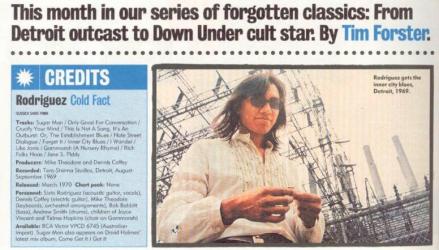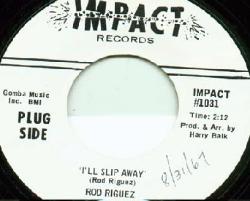|
Home
News
Introduction
The Man
The Myths
The Music
The Magic
The Memories
The Forum
|

Mojo August 2002
Buried Treasure: From Detroit Outcast to Down Under Cult Star
by Tim Forster
Ask the question "Who is Rodriguez?" of any Australian or South African music
fan and there will probably be more than a glimmer of recognition. Ask any
American and you'll almost certainly draw a blank. In the musical melting pot
of the late '60s Detroit, many artists lost their audience somewhere between
Motown and the MC5, yet few would have expected one of Michigan's forgotten
sons to find fame halfway across the world - least of all Rodriguez himself.
Born in 1942 to Mexican immigrant parents (as their sixth child he was
christened Sixto), a profoundly working-class, Spanish-speaking upbringing
gave Rodriguez an early insight into life as an outsider, a theme that would
inform much of his songwriting - tales of social alienation, drug induced paranoia
and doomed relationships. He started his career in music "playing when I was
about 17. I think it was a way to escape and get out into the world. I've
always been solo; it's the easier career, and you don't have to depend on
other people..."
An early folk-rock single for the local Impact label, I'll Slip Away was
doomed by the company's bankruptcy, but in 1969 he signed to the new Buddah
offshoot Sussex. Cold Fact was its first release. Overseen by staff producers
Mike Theodore and Dennis Coffey (later of the Detroit Guitar Band), its
opening track, a distinctly bitter-tasting track Sugar Man, set the tone.
Over a subtle backing of guitar, brass and electronic effects, Rodriguez
reeled off a list of pharmaceuticals - silver magic ships, jumpers, coke,
sweet Mary Jane - before delivering a stark message: "Sugar man, met a false
friend/On a lonely dusty road/Lost my heart when I found it/It had turned to
jet black coal..."
Although the pace was briefly lifted by raucous fuzz-rocker Only Good For
Conversation, the album's sparse production gave prominence to Sixto's
acoustic guitar and haunting vocals. Establishment Blues, a soapbox rant of
rhyming couplets, almost parodied the protest song ("Gun sales are
soaring/Housewives find life boring/Divorce the only answer/Smoking causes
cancer") while Inner City Blues - a title that pipped Marvin Gaye by six
months - pitched the runaway girl in the city against her suburban parents
("The curfew's set for eight/Will it ever be straight/I doubt it"). Against
this harsh backdrop only the lascivious sing-along I Wonder managed to sound
up-beat.
Yet if Cold Fact was short on happy endings, that was scarcely surprising -
the singer was simply writing about what he saw around him. Surprisingly,
Rodriguez recalls a certain amount of pressure to make the LP still more
controversial. "Mike Theodore said, 'Can you add these two songs [Gommorah
and Hate Street Dialogue] to it?' And I said Sure! But I fixed the words. I
said, If I talked like that I couldn't even go back home! How could I refuse?
I was just getting out there..."
Despite a favourable review in Billboard, the album never troubled its
charts. Sussex, meanwhile struck gold with Bill Withers, and although they
financed one further LP - Coming From Reality, recorded at London's Lansdowne
Studios - it fared no better than Cold Fact. Rodriguez quit music to raise a
family and, apart from a brief, unsuccessful foray into politics, just seemed
to disappear...
Yet the most extraordinary phase of his career had only just begun. Festival
Records, the label that had launched The Bee Gees, imported Cold Fact to
Australia. After rapidly selling out, the LP was picked up by A&M the
following year and won a cult following among the disaffected youth of New
Zealand and South Africa. By the start of the '80s, Rodriguez was touring
with Midnight Oil. A decade on, when the album was issued on CD, it went
platinum. After slipping into temporary obscurity once more - during which
increasingly bizarre rumours circulated about his 'demise' - he recently
travelled to South Africa for two sell-out stadium tours. A subsequent live
album became his first release in almost 30 years.
Back in Detroit Rodriguez is unerringly modest about his achievements. "Was I
an angry young man? When I compare my work to today's music - like Metallica,
Rage Against The Machine and rap - I just say: Where was the outrage?"
Discover more at: www.new.co.za/~currin/rodriguez.html
(Thanks to John Samson and Stephan Forster for info and scans)
The above article is based on one Tim originally wrote in January 2001. Read it below...
January 2001
Cold Fact - Sixto Rodriguez
by Tim Forster
Until recently a mysterious figure, Sixto Rodriguez was born in Detroit,
Michigan in 1942 to Mexican immigrant parents - his first name chosen
because he was their sixth child. Possessed of an distinctive voice,
Rodriguez was a singer / songwriter steeped in the folk and blues traditions
of his times and comparisons with Dylan and Donovan are inevitable and not
undeserved. However, a profoundly working class upbringing in this
industrial - and musical - heartland helped to make his work quite unique.
 In April 1967 he recorded five original songs for the local Impact label.
The A-side of the resulting single, 'I'll Slip Away' (later re-cut in the
mid 70s), was an atmospheric number with considerable commercial potential,
the B-side, 'You'd Like To Admit It', a contrasting folk-rocker in which the
singer berated an ex-girlfriend for going off with a 'hick'. Unfortunately it
became Impact's penultimate release before the label went under. Of the
remaining tracks 'Forget It' would later be re-recorded for his first LP and
'To Whom It May Concern' for the second, but the intriguingly titled 'That
Discotheque' remains unreleased in any form.
In April 1967 he recorded five original songs for the local Impact label.
The A-side of the resulting single, 'I'll Slip Away' (later re-cut in the
mid 70s), was an atmospheric number with considerable commercial potential,
the B-side, 'You'd Like To Admit It', a contrasting folk-rocker in which the
singer berated an ex-girlfriend for going off with a 'hick'. Unfortunately it
became Impact's penultimate release before the label went under. Of the
remaining tracks 'Forget It' would later be re-recorded for his first LP and
'To Whom It May Concern' for the second, but the intriguingly titled 'That
Discotheque' remains unreleased in any form.
Undaunted, two years later Rodriguez found himself signed to the newly
founded Hollywood label, Sussex (Bill Withers' first label), and the classic
'Cold Fact' LP emerged as their first release. Recorded in 1969 and skilfully
produced by two other Impact refugees, Mike Theodore and Dennis Coffey, it
opened with the trippy but dark 'Sugar Man'. Over a subtle backing of
acoustic guitar and electronic effects Rodriguez's lyrics were starkly
honest:
"Sugar man, met a false friend / On a lonely dusty road / lost my heart when
I found it / it had turned to dead black coal. / Silver magic ships you
carry / Jumpers, coke, sweet Mary Jane / Sugarman, you're the answer / That
makes my question disappear / Sugarman, 'cos I'm weary / Of those double
games I hear."
The themes of many other songs on the album can be gleaned from the titles
alone: 'Crucify Your Mind' (drugs), 'This Is Not A Song, It's An Outburst:
Or, The Establishment Blues', 'Inner City Blues' and 'Rich Folks Hoax'
(social unrest and political apathy), but there were also beautiful,
bittersweet love songs in 'Forget It' and 'Jane S. Piddy'. Rumour has it
(although Rodriguez has denied the connection) that 'Like Janis' was
inspired by Janis Joplin. The brutally direct 'Only Good For Conversation'
stands out as a great fuzz rocker, but for the most part the album gives
prominence to Rodriguez's acoustic guitar and powerful lyrics.
'Coming From Reality', which was recorded at London's Lansdowne Studios, came
in a striking die-cut gatefold sleeve. However, despite featuring some
excellent musicianship - especially the lead guitar work courtesy of ace
session man Chris Spedding - it somehow contrived to be less interesting
than its predecessor. The most immediately striking tracks are undoubtedly
those where the band is in full flight - 'Climb Up On My Music' and
'Heikki's Suburban Bus Tour' for instance - but the more restrained acoustic
numbers repay repeated listening. 'Sandrevan Lullaby - Lifestyles' (the
title is a conflation of the names of Rodriguez's two daughters) and 'Cause'
were both subtly orchestrated and their lyrics echoed the dark emotional
themes of the debut album.
Three further tracks recorded in the mid-seventies - a new version of the
Impact single 'I'll Slip Away', 'Can't Get Away' and 'Street Boy' - were
each the equal of any of his previous works, but none were released at the
time. After neither album made any impact in the States, Rodriguez seemed to
simply disappear. That, however, was really only the beginning of the most
extraordinary phase of his career. When, in 1970, some enterprising folk at
Festival Records imported 400 copies of 'Cold Fact' to Australia they rapidly
sold out. The LP was subsequently issued by A&M in 1971 and as its fame
spread it gradually acquired a cult following amongst the disaffected youth
both there and in countries like New Zealand and South Africa. When it was
finally issued on CD in those markets it went platinum and Rodriguez was so
well known by the beginning of the 80s that he even toured Australia with
Midnight Oil. After disappearing into temporary obscurity once more - during
which increasingly bizarre rumours circulated about his demise - he recently
returned to South Africa for a sell-out stadium tour. Both albums have
subsequently been reissued in all formats in those countries, while a CD
'Rodriguez: At His Best' (Blue Goose VPCD 6748) collects together highlights
from both LPs and adds the three unreleased mid-seventies tracks for good
measure. The A-side of the Impact single, meanwhile, is available on 'The
Best Of Impact Records' (Collectables CD COL 5883).
This article originally published online at:
Fuzz, Acid and Flowers
and Head Heritage
|
|

 In April 1967 he recorded five original songs for the local Impact label.
The A-side of the resulting single, 'I'll Slip Away' (later re-cut in the
mid 70s), was an atmospheric number with considerable commercial potential,
the B-side, 'You'd Like To Admit It', a contrasting folk-rocker in which the
singer berated an ex-girlfriend for going off with a 'hick'. Unfortunately it
became Impact's penultimate release before the label went under. Of the
remaining tracks 'Forget It' would later be re-recorded for his first LP and
'To Whom It May Concern' for the second, but the intriguingly titled 'That
Discotheque' remains unreleased in any form.
In April 1967 he recorded five original songs for the local Impact label.
The A-side of the resulting single, 'I'll Slip Away' (later re-cut in the
mid 70s), was an atmospheric number with considerable commercial potential,
the B-side, 'You'd Like To Admit It', a contrasting folk-rocker in which the
singer berated an ex-girlfriend for going off with a 'hick'. Unfortunately it
became Impact's penultimate release before the label went under. Of the
remaining tracks 'Forget It' would later be re-recorded for his first LP and
'To Whom It May Concern' for the second, but the intriguingly titled 'That
Discotheque' remains unreleased in any form.

